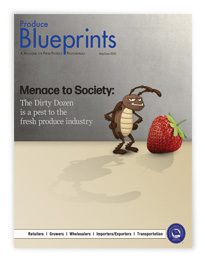The new issue of Produce Blueprints has a cover story (written by me) on the industry’s favorite enemy: the Environmental Working Group’s annual Dirty Dozen list, which highlights the (allegedly) bad and ugly among fruits and vegetables in terms of pesticide residues.

The Dirty Dozen has aroused widespread hatred among people in the industry, many of whom regard its mere existence as a personal insult.
As I say in the article, the methodology of the Dirty Dozen has been debunked often. Countermeasures by organizations like the Alliance for Food and Fiber have done a great deal to reduce its negative effects on public opinion.
That’s not what I’m going to talk about here.
I do not like manufacturing demons, which, to my mind, is as pernicious as it is common in current discourse.
But as I also say in the article, I think a much graver and more difficult concern faces the fresh fruit and vegetable industry. In fact, pesticide residues in food don’t even make the list of current top environmental concerns among the public.
This problem is simply the dietary habits of the American population, which over the past couple of generations have skewed more and more toward fast and processed food. These categories by and large exclude fresh fruits and vegetables.
I do not believe that the industry will solve the problem of stagnant produce consumption levels unless it acknowledges this fact.
After all, what population are we dealing with? A recent study from the Centers for Disease Prevention surveyed Americans about their food habits.
Nationally, fewer than 40 percent of adults reported eating one or more serving of fruit per day.
It is true that some 79 percent of the U.S. public say they eat more than one vegetable serving per day.
But you have to wonder what this figure would look like if french fries weren’t included.
It is very difficult to look at the consumption habits of the U.S. population and conclude that the ingestion of toxic pesticides from fruits and vegetables is of anything more than the most minimal concern—especially in the face of other public health problems, such as obesity.
Ironically, someone who did eat fruits and vegetables to an extent that would cause pesticide health concerns would have a much healthier diet than the typical American.
The produce industry has done a creditable job of debunking excessive claims of pesticide residues in fruits and vegetables. It can take satisfaction from this success.
Now it is time to take on the real issue that is cramping produce consumption in this nation. It will be a much bigger challenge than the Dirty Dozen.



